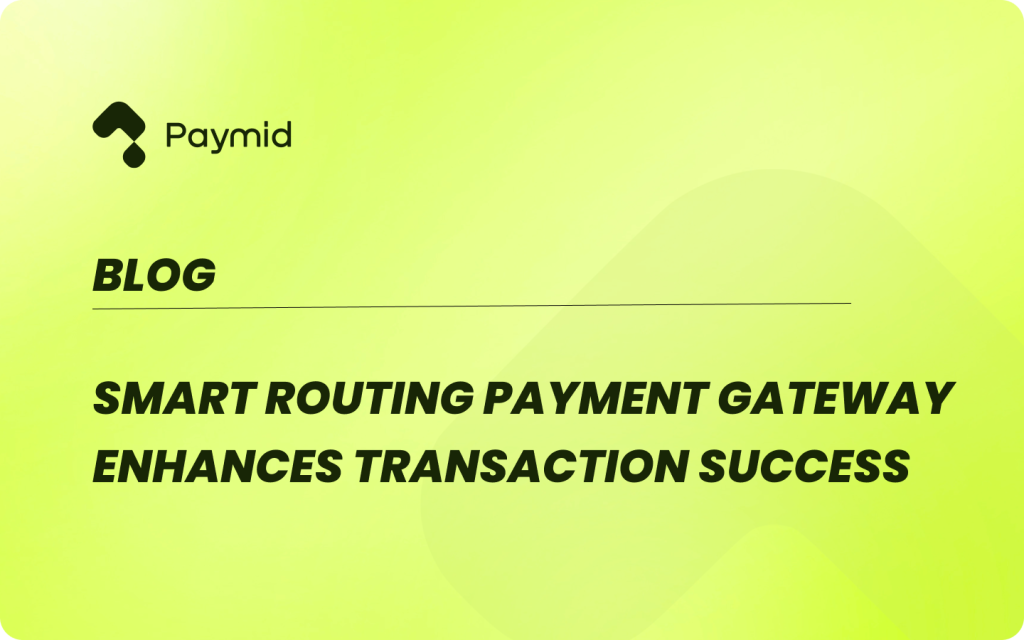Smart Routing Payment: Components, Benefits & Process

In today’s rapidly evolving digital landscape, the search for efficiency and reliability in online transactions leads us to the intelligent technologies powering smart routing payment gateways. These advanced solutions, leveraging artificial intelligence and sophisticated routing tools, mark a significant leap toward enhancing the success rates of digital payments.
Recognizing the critical role these innovations play, not just in payment processing but in shaping the future of e-commerce, underscores the importance of understanding how smart routing payment gateways operate and their impact on the business ecosystem.
By optimizing payment methods and utilizing the most effective payment gateways, businesses can significantly improve their transaction success rates, reduce costs, and offer superior customer experiences.
⚡ Key Takeaways
Read More:
- Easy Ways to Accept Payments Online Without a Merchant Account
- Payment Routing: Best Practices, Types, And Tips
- Alternative Payment Methods: The Future of Transactions
- What is a Merchant Identification Number (MID)?
What is Smart Routing?
Smart routing is a dynamic method used by merchants to optimize payment transactions across various processors to achieve higher authorization rates and lower costs. It involves setting rules that determine the best processor for each transaction based on specific criteria, such as geographical location, transaction value, and the type of payment method used.
Smart routing enables merchants to direct payments through the most effective channels by analyzing real-time data about transaction conditions and processor performance. This system assesses each transaction individually, using intelligent logic and rules to route the payment to the gateway with the highest likelihood of success.
For example, payments made in Greece by cards issued there are often routed to a local processor known for higher authorization rates [1] .
Key Components of Smart Routing
The components of smart routing include multiple gateway access, cascading payments, and intelligent decision-making based on a wide array of transaction details. Merchants can configure their smart routing system to automatically reroute failed transactions to alternative processors, enhancing the chances of approval and reducing potential revenue loss.
This is particularly beneficial for businesses with extensive geographical reach or those in rapid expansion phases, as it allows for the smooth handling of diverse payment methods and currencies [2] .
Smart routing systems also minimize latency by selecting the fastest processing routes, crucial for industries where speed is paramount. Additionally, they can direct high-risk or high-value transactions to processors with robust fraud prevention measures, thereby safeguarding against financial losses and enhancing overall transaction security [1] .
By implementing smart routing, businesses not only improve their transaction success rates but also create a more efficient, reliable, and customer-friendly payment experience.
This strategic approach to payment processing plays a critical role in modern e-commerce by ensuring transactions are fast, successful, and cost-effective.
How Smart Routing Works
Smart routing, an integral component of modern payment gateways, utilizes advanced artificial intelligence technologies and sophisticated algorithms to enhance transaction success rates. This process is pivotal in ensuring that payments are processed efficiently and effectively, catering to the specific needs of each transaction.
1. AI and Algorithmic Approach
At the core of smart routing lies an AI-driven system that employs machine learning algorithms to analyze and learn from vast amounts of transaction data. These algorithms are adept at detecting patterns that may not be immediately apparent to human analysts. By leveraging such capabilities, smart routing systems can forecast transaction outcomes and optimize the routing process to minimize declines and maximize approvals. The use of AI not only streamlines the payment process but also enhances the accuracy and speed of transaction approvals, making it a crucial tool for businesses aiming to improve their operational efficiency.
2. Real-time Transaction Analysis
Smart routing systems perform real-time analysis of each transaction, considering various factors such as the payment method, currency, and geographical location of the customer. This real-time capability allows the system to make informed decisions on the best payment gateway or processor for each transaction. [2]
By dynamically selecting the optimal route, the system ensures that transactions are processed through the channel with the highest likelihood of success. This not only reduces the incidence of failed transactions but also helps in maintaining a smooth and uninterrupted payment experience for customers.
The continuous learning and adaptation of smart routing algorithms mean that the system’s decision-making process is always evolving, staying responsive to new data and changing market conditions.
This adaptability is key to maintaining high transaction success rates and adapting to the diverse and ever-changing landscape of global e-commerce.
Benefits of Smart Routing for Businesses
1. Increased Success Rates
Smart routing significantly enhances payment authorization rates by intelligently directing transactions to the payment processors with the highest success probabilities. This sophisticated approach evaluates numerous factors such as card type, transaction amount, and geographical location, ensuring each payment is routed to the network most likely to approve it [3] .
By leveraging vast pools of transaction data, smart routing predicts and selects pathways that maximize approval rates, resulting in an immediate surge in successful transactions and a notable increase in revenue for businesses [3] .
2. Cost Efficiency
The implementation of smart routing reduces the need for payment retries, which in turn decreases the overall cost associated with processing payments. Merchants benefit from lower transaction fees and reduced currency conversion costs by automatically routing payments through the most cost-effective channels [4] .
Furthermore, the ability to reroute failed transactions to alternative processors minimizes potential revenue losses and saves time and effort that would otherwise be spent on troubleshooting [5] . This dual approach not only cuts down operational costs but also enhances transaction reliability and efficiency.
3. Global Reach
Smart routing empowers businesses to operate on a global scale with ease. It supports multiple currencies and payment methods, enabling merchants to accept payments from customers worldwide without the hassle of manual intervention [6] . By optimizing transaction routes, smart routing ensures high reliability and uptime, which is crucial for maintaining customer trust and satisfaction in diverse markets.
Additionally, the system’s built-in redundancy and failover mechanisms safeguard against network disruptions or failures, providing a seamless payment experience across different regions [7] .
Through these strategic benefits, smart routing stands out as a pivotal technology for businesses aiming to optimize their payment processes and expand their market reach while maintaining high standards of customer service and operational efficiency.[8]
Case Studies and Examples
1. Ecommpay Example
Ecommpay, a UK-based payment service provider, has demonstrated the effectiveness of smart routing through its comprehensive gateway solutions. Offering a variety of B2B and B2C payment methods, Ecommpay acts as a direct card acquirer and processor. Their system includes Full-Suite Open Banking that enables Account-to-Account (A2A) payments, providing instant pay-ins, payouts, and automatic reconciliations [5].
Furthermore, Ecommpay’s smart routing capabilities are integrated into their Risk Control System, which utilizes anti-fraud filters and transaction monitoring to optimize payment processing and minimize fraud risks [5] .
2. BlueSnap Success Story
BlueSnap, known for its Global Payment Orchestration Platform, has capitalized on intelligent payment routing to enhance transaction success rates significantly. Their platform supports local card acquiring in 47 countries and provides multiple levels of tokenization and 3-D Secure options [6] .
By analyzing transaction characteristics such as currency, issuing country, and payment type, BlueSnap’s intelligent payment routing has been shown to increase profit margins by up to 6%, demonstrating a direct impact on revenue gains and cost reductions [6] .
This approach not only optimizes payments but also supports diverse global payment needs, helping businesses improve their bottom line [6] .
These examples underscore the transformative potential of smart routing in the payment industry, illustrating how businesses can leverage this technology to enhance transaction success rates and expand their global reach.[9]
Ending This Article
As we wrap up, it’s clear that the adoption of smart routing in payment processing is not just an option but a necessity for businesses aiming to thrive in the competitive digital marketplace. The implications of this technology extend far beyond improved transaction success rates, offering the potential to redefine the e-commerce landscape through enhanced efficiency, security, and global reach.
Thus, businesses are encouraged to consider smart routing as a strategic investment in their future, enabling them to stay at the forefront of technological advancement and customer satisfaction. In this era of digital transformation, the journey towards optimized payment processing is both exciting and essential, promising a bright future for businesses and consumers alike.[10]

